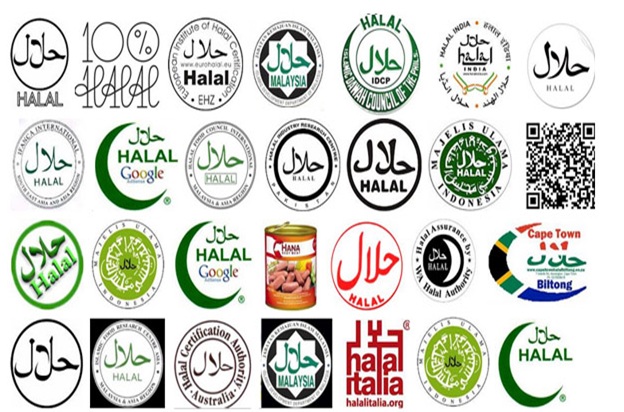Halal (Arabic: حلال ḥalāl, “permissible”) is a term designating any object or an action which is permissible to use or engage in, according to Islamic law. The term is used to designate food seen as permissible according to Islamic law.
The terms halal and haram are applied to many facets of life; and one of the most common uses of these terms is in reference to meat products, food contact materials, and pharmaceuticals. In Islam there are many things that are clearly halal or haram. There are also items which are not as clear, and for which further information is needed. Items that are not clear are called mashbooh, which means “questionable.” ‘Halal’ means permissible. ‘Haram’ means forbidden. In Islam, other forbidden items include pork and all its products; ‘animals improperly slaughtered’; alcoholic drinks, carnivorous animals; birds of prey; and any food contaminated with any of these products.
By SAIF ALAM SIDDIQUI
The impact of religion on food consumption depends on the religion itself and on the extent to which individuals interpret and follow the teachings of their religion. Most religions forbid certain foods (for example pork in Judaism and Islam, or pork and beef in Hinduism and Buddhism) except for Christianity which has no food taboos. The consumption of animal products, and more specifically meat and meat products, is most strictly regulated in cases where religious considerations prevail.
One of those religions with food prohibitions is Islam. “Islam” is an Arabic word which means absolute surrender to Allah (God). In Islam, the source of power is Allah and all the creation (matter, energy, and life) obeys His laws. The Islamic system of life is called Shari’ah. There are basic foundational keys of Islam (submission to the will of God): Iman (believe), Salat (prayer), Fasting, Zakat (alms giving), and Hajj (pilgrimage to Mecca). In Islam, forbidden things are named “Haram” while permissible things are called “Halal”. The Prophet (SAW) presents himself as a practical man, giving guidance in every situation related to human social life. He gives the practical shape of Adal (justice), honesty, and Ibadah (worship) which are elaborated by his actions. The source of the Muslim’s knowledge is the Quran, Prophet’s (SAW) acts and, Ijma (accepted under the Shariah laws by consensus of opinion). Violating Islamic values is named a crime while earning through Halal (Shariah-compliant) is considered an act of worship. Riba (interest) is prohibited in Islam and Muslims should not earn through charging interest. In addition, Islam prohibits earning abnormal profit from business transactions and forbids the accumulation of wealth. Halal products are those that are Shariah compliant, i.e. do not involve the use of haram (prohibited) ingredients, exploitation of labour or environment, and are not harmful or intended for harmful use. Islam rules prohibit the consumption of alcohol, pork, blood, dead meat and meat that has not been slaughtered according to Islamic rulings
HALAL
Halal is an Arabic term meaning “permissible”. In English, it most frequently refers to food that is permissible according to Islamic law. In the Arabic language, it refers to anything that is permissible under Islam. Its antonym is Haram. The terms Halal and Haram will be used strictly to describe food products, meat products, cosmetics, personal care products, food ingredients, beverages and food contact materials. Which foods are Halal or which foods are haram is decided according to the Holy Quran and the Glorious Shari’ah. Halal products are those that are Shariah compliant, i.e. do not involve the use of haram (prohibited) ingredients, exploitation of labour or environment, and are not harmful or intended for harmful use. Muslims are obliged by religion to clearly scrutinize products to make sure they are Halal. In addition, they are strongly encouraged by the Islamic teachings to shy away from consumables that are doubted. The Halal dietary laws determine which foods are ‘lawful’ or permitted for Muslims. These laws are found in the Quran and the books of Hadith (the Traditions). Islamic law is referred to as Shari’ah and has been interpreted by Muslim scholars over the years. The basic principles of the Islamic laws remain definite and unaltered. However, their interpretation and application may change according to time, place and circumstances. Besides two basic sources of Islamic law, the Quran and the Hadith, other sources of jurisprudence are used in determining the permissibility of food when a contemporary situation is not explicitly covered in the basic sources. The third source is called Ijtihad, or to exert oneself fully to derive an answer to the problem. This could be accomplished by one or both of the following:
i. Ijma, meaning consensus of opinion.
ii. Qiyas, meaning reasoning by analogy.
Current issues of GMO (genetically modified organism) foods, animal feed and hormones are discussed in the light of these two concepts and several other lesser sources of Islamic jurisprudence. Biotechnology, unconventional sources of ingredients, synthetic materials, and innovations in animal slaughter and meat processing are some of the issues Muslim scholars are dealing with in helping consumers make the right choices. Why do Muslims follow the Halal dietary laws? The main reason for the observance of the Islamic faith is to follow the Divine Orders:
‘O ye who believe! Eat of the good things wherewith WE have provided you, and render thanks to ALLAH if it is He whom ye worship’ (Quran 2:172).
God reminds the believers time and again in the Holy Scripture to eat what is Halal-un-Tayyaban meaning ‘permitted, and good or wholesome’:
‘O, Mankind! Eat of that which is Lawful and Wholesome in the earth….’ (Quran 2:168).
‘Eat of the good things. We have provided for your sustenance, but commit no excess therein’ (Quran 20:81).
Again in the Quran, in Chapter 6 titled ‘Cattle’, Muslims are ordained to eat the meat of animals upon which Allah’s name has been invoked. This is generally interpreted that an invocation has to be made at the time of slaughtering an animal:
‘Eat of that over which the name of Allah hath been mentioned, if ye are believers in His revelations’ (Quran6:119).
While Muslims eat what is permitted specifically or by implication or by omission and being silent about it, they avoid eating what is specifically disallowed, such as:
And eat not of that whereupon Allah’s name hath not been mentioned, for lo, It is abomination. Lo! The devils do inspire their minions to dispute with you. But if ye obey them, ye will be in truth idolaters. (Quran 6:122)
The majority of the Islamic scholars are of the opinion that this verse refers to the proper slaughtering of the allowed animals. Since Muslim dietary laws relate to Divine permissions and prohibitions, if anyone observes these laws he/she is rewarded in the hereafter and if one violates these laws he/she may receive punishment accordingly. The rules for those foods that are not specifically prohibited may be interpreted differently by various scholars. The things that are specifically prohibited are just a few in numbers, summarised in the following verse:
Forbidden unto you are: carrion and blood and swine flesh, and that which hath been dedicated unto any other than Allah, and the strangled, and the dead through beating, and the dead through falling from a height, and that which hath been killed by the goring of horns, and the devoured of wild beasts saving that which ye make lawful, and that which hath been immolated to idols. And that ye swear by the divining arrows. This is abomination. (Quran 5:3)
Although these permissions and prohibitions are enough for a Muslim to observe the laws, it is believed that the dietary laws are based on health reasons due to the impurity or harmfulness of what they prohibit.







0 Comments